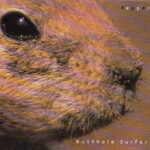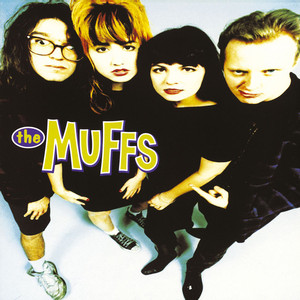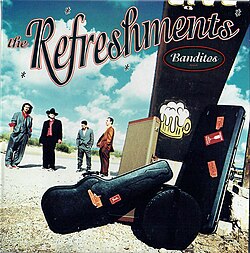 Some songs sound like they were beamed in from another planet, and Butthole Surfers’ “Pepper” is one of them. It doesn’t fit anywhere neatly—too trippy for alternative rock, too deadpan for pop, too catchy for punk. Yet in the summer of 1996, this bizarre spoken-word groove about death, disease, and weird small-town characters somehow became a radio hit.
Some songs sound like they were beamed in from another planet, and Butthole Surfers’ “Pepper” is one of them. It doesn’t fit anywhere neatly—too trippy for alternative rock, too deadpan for pop, too catchy for punk. Yet in the summer of 1996, this bizarre spoken-word groove about death, disease, and weird small-town characters somehow became a radio hit.
“Pepper” wasn’t just a single; it was a strange cultural event—a moment where the underground snuck its way into the mainstream without changing its clothes. It sounded like nothing else on the radio: hypnotic, grim, sardonic, and cool in a way that was almost accidental.
At its core, “Pepper” captures everything that made the 1990s such a fascinating decade in music. It’s cynical but catchy, ironic yet emotional, detached but deeply human. And it could only have come from a band as wonderfully warped as the Butthole Surfers.
Chaos as Art
To understand “Pepper”, you need to understand the chaos that birthed it. The Butthole Surfers came up through the American underground of the early 1980s, a punk-adjacent band from San Antonio, Texas, led by two men who treated rock music like a surrealist experiment.
Frontman Gibby Haynes and guitarist Paul Leary met while working at an accounting firm—two college grads with day jobs who decided to blow up rock conventions for fun. What followed was one of the most unpredictable careers in American music. Their live shows became legendary for their absurdity: strobe lights flashing at seizure-inducing speed, films of surgeries projected behind the band, nudity, distortion, and chaos. They were loud, confrontational, and disturbingly funny.
Through the ’80s, albums like Psychic… Powerless… Another Man’s Sac and Locust Abortion Technician pushed the boundaries of noise rock and psychedelia. They were adored by critics and feared by club owners. They didn’t care. The Butthole Surfers were more performance art than band—deliberately weird, unapologetically abrasive, and allergic to normalcy.
So how did a band like that end up with a No. 1 alternative hit?
The answer: by accident.
The Birth of “Pepper”
By the mid-1990s, the alternative explosion had changed the landscape. Nirvana and Pearl Jam had opened the door for the oddballs. Labels were suddenly looking for anything that could be marketed as “alternative.” The Butthole Surfers, improbably, signed to Capitol Records and began work on Electriclarryland—a title that already suggested something between parody and madness.
In the studio, Leary started playing around with a looping hip-hop drumbeat and a swirling bassline. Haynes began improvising lyrics in a flat, rhythmic cadence—half-rap, half-spoken word. The verses were absurd, surreal, and weirdly poetic. The chorus was haunting and melodic. It shouldn’t have worked. But it did.
“Marky got with Sharon, Sharon got Sherise / She was sharin’ Sharon’s outlook on the topic of disease.”
The song played like a stoned conversation overheard in a diner at midnight—disconnected stories about small-town youth, each one darker than the last.
Leary’s production, meanwhile, was unlike anything else on rock radio. A slow, hypnotic drum loop. Distant, ghostly guitars. Layers of reverb that made everything feel like it was floating in a dream.
By the time the band finished it, they knew they had something catchy—but they didn’t think it was that catchy. Capitol did. And in a rare twist of fate, the label was right.
Surrealism on the Airwaves
“Pepper” hit the air in 1996 and quickly became a phenomenon. It topped the Billboard Modern Rock Tracks chart and introduced millions of unsuspecting listeners to a band whose previous work included songs like “The Shah Sleeps in Lee Harvey’s Grave.”
The song stood out immediately. This wasn’t the grunge hangover of post-Nirvana radio or the stadium bombast of mid-’90s rock. “Pepper” was mellow but menacing, trippy but grounded, funny but fatalistic.
It sounded like the Butthole Surfers were smirking through the apocalypse.
The Sound of Detached Doom
Part of “Pepper”’s genius lies in its atmosphere. The song unfolds like a half-remembered dream, equal parts lullaby and eulogy. The steady beat gives it a hip-hop edge, while the dreamy guitars swirl in and out like smoke.
Then there’s Gibby Haynes’ voice—calm, emotionless, yet magnetic. His delivery is part narration, part hypnosis. He describes death, disease, and disaster with the same tone someone might use to list grocery items.
“Tommy played piano like a kid out in the rain / Then he lost his leg in Dallas, he was dancin’ with a train.”
Each line introduces a new vignette, a character who meets a bizarre fate. Some are victims of violence. Some are victims of themselves. But the tone never shifts. There’s no judgment, no mourning—just storytelling.
The chorus pulls it all together:
“They were all in love with dying, they were drinkin’ from a fountain that was pourin’ like an avalanche comin’ down the mountain.”
It’s a line that sounds cosmic and cryptic at once, like a stoner koan about fate. The characters in the song are in love with destruction, drawn toward the edge, drinking from the chaos of life.
And underneath it all, the music keeps looping—steady, hypnotic, unstoppable.
Humor and Horror in Equal Measure
Butthole Surfers have always mixed horror with humor, and “Pepper” is no exception. It’s a dark comedy of errors, a collage of absurd tragedies. Someone loses a leg. Someone gets arrested. Someone falls in love with someone else’s disease.
The humor doesn’t lessen the darkness—it deepens it. By treating death and suffering with flippant rhyme schemes and sing-song cadences, Haynes turns the absurdity of life into something oddly comforting.
That’s the paradox of “Pepper.” It’s a funny song about terrible things, and it’s a catchy song about people dying. The contrast makes it unforgettable.
A Soundtrack for the 1990s
If the 1990s had a mood, “Pepper” captured it perfectly. This was the decade of irony and detachment, of grunge hangovers and disillusioned youth. The optimism of the ’80s was gone; in its place was cynicism and humor as defense mechanisms.
“Pepper” embodied that cultural shrug—the sense that life was ridiculous and the only sane response was to laugh about it. It was existential dread wrapped in a beat you could nod your head to.
It also felt distinctly American in its weirdness. The song’s small-town characters—drifters, racists, addicts, and dreamers—felt like fragments of a bigger story about a country spinning its wheels in the dust.
That’s part of why “Pepper” hit so hard. It wasn’t a love song, or a protest song, or a feel-good anthem. It was a mirror held up to the absurdity of existence, delivered with a grin.
The Poetry of the Everyday
Lyrically, “Pepper” is strange poetry. Each verse reads like a collection of urban legends or bizarre newspaper headlines. The names—Marky, Sharon, Tommy, Mikey—sound almost too ordinary, which makes their absurd fates hit even harder.
“Mikey had a facial scar and Bobby was a racist / They were all in love with dying, they were doin’ it in Texas.”
There’s no hero or villain here, no resolution. Just the randomness of fate. In Haynes’ world, everything is arbitrary: who lives, who dies, who laughs, who doesn’t. It’s morbid, yes, but it’s also true.
This kind of storytelling—playful, grim, detached—owes more to Southern Gothic literature than to rock lyrics. Haynes might sound like he’s joking, but he’s channeling something deeply American: the grotesque humor of Flannery O’Connor, the surreal fatalism of Faulkner.
The Irony of a Hit
For a band that spent a decade reveling in chaos, the success of “Pepper” was its own cosmic joke. Butthole Surfers had built a career out of mocking the very idea of fame, yet here they were—on MTV, on the radio, even performing on mainstream TV shows.
Gibby Haynes later said they were baffled by the song’s success. “It just kind of happened,” he once remarked. The song wasn’t crafted to be a hit; it was just another experiment that accidentally resonated.
That accidental nature is part of what makes it timeless. Nothing about “Pepper” feels calculated or commercial. It feels like it just exists, like it was pulled from the air and captured by accident.
The song gave the band its only major hit, but it didn’t change them. They didn’t chase radio success or try to repeat the formula. They just carried on being the Butthole Surfers—unpredictable, hilarious, and subversive.
The MTV Aesthetic
The accompanying video for “Pepper” sealed its place in ’90s pop culture. Shot in stark black and white, it depicted surreal imagery: dancers in slow motion, religious symbols, shadowy faces, and snippets of the band looking detached and spectral.
It didn’t tell a story—it created a feeling. Watching it felt like flipping through a dream or catching half-glimpses of other people’s nightmares. It matched the song perfectly: strange, hypnotic, and just slightly sinister.
In a sea of flashy rock videos, “Pepper” stood out for its simplicity and mystery. It looked more like an art film than a music video, which only deepened its cult appeal.
A Song Out of Time
Listening to “Pepper” today, nearly three decades later, it still sounds fresh. The looping beat feels modern, the lyrics still hit with their eerie mix of humor and horror, and the tone of the whole thing remains deliciously ambiguous.
It’s hard to pin down why it works so well. It’s not conventionally emotional, yet it gets under your skin. It’s not danceable, yet you move to it. It’s not serious, yet it leaves a chill behind.
Most songs from the mid-’90s are instantly dated by their production or their earnestness. “Pepper”, on the other hand, could drop on an indie playlist today and still feel subversive. It’s timeless in its weirdness.
Influence and Echoes
The song’s influence has quietly spread over the years. Its mix of deadpan delivery, looping beats, and surrealist storytelling can be heard in artists from Beck to Gorillaz, from Cage the Elephant to MGMT. Even certain strands of modern indie-psychedelia—bands that blur humor and existential dread—owe something to “Pepper.”
It also hinted at how hip-hop and alternative rock could overlap in more abstract ways, years before that crossover became common. Haynes’ flow isn’t rap, exactly, but it’s rhythmically spoken poetry laid over a groove—a template that artists like Beck and later Gorillaz would refine.
And then there’s its cultural influence. “They were all in love with dying” has become a kind of internet shorthand for ironic melancholy. The song has lived far beyond its original era, surviving as a meme, a sample, and a strange comfort for people who find humor in chaos.
The Joke That Wasn’t a Joke
The Butthole Surfers were pranksters, sure—but “Pepper” isn’t just a joke. It’s a strangely beautiful piece of art hiding behind its own smirk. Beneath the sarcasm lies something sincere: a recognition of how random, cruel, and funny life can be.
Haynes once said he loved songs that felt like inside jokes between the band and the audience. “Pepper” feels like that—a wink at anyone who’s ever felt like the world makes no sense, but you might as well hum along.
It’s comforting, in a weird way. The laughter in the face of death. The poetry in the absurd. The rhythm that keeps going even as everything else collapses.
The Enduring Avalanche
Decades later, “Pepper” remains the perfect paradox: a pop hit by a band that was never supposed to have one, a catchy song about chaos, a radio anthem built on nihilism.
It’s the sound of life’s randomness distilled into four minutes of groove and rhyme. And that’s why it still resonates. It’s not nostalgia—it’s truth.
The Butthole Surfers took the bizarre and made it universal. They turned death into melody, nonsense into meaning, irony into art.
And through it all, the fountain keeps pouring like an avalanche coming down the mountain. No one knows where it starts or where it ends—but everyone, for just a moment, can hum along.


